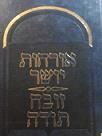A Short Tribute
Hacham Yitzhak Molcho, son of Abraham, was born circa 1721 in Salonica. While still a young man, he was appointed rabbi of the Sicilian Jews living in Salonica. He developed a reputation as a fiery preacher with outstanding abilities and was well-loved by his public. Despite his devotion to his community, he would not hesitate to reprimand even its wealthier members when the situation called for it.
Hacham Yitzchak Molcho passed away on 28 Iyar 5541 (1781) during a local epidemic. He authored two works: Orchot Yashar was first printed anonymously in Salonica in 1769; his sons had a second edition printed in 1791 in which the author's name appeared. Zoveakh Toda, his second book, concerns halakha on ritual slaughter according to Salonica customs.
A few quotes from the Rabbi on 'Torah Study' in which he teaches how to fulfill the mitzvah of "writing down this poem" by purchasing a book on morals
When on the way to the study house, one should attempt to purchase a book on ethics or parables from one's own money, in keeping with one's means. This is a way of fulfilling the mitzvah "Therefore, write down this poem", as the rulers of the Law, of blessed memory, have instructed us. For these days it is preferable to purchase books of Chumash, Talmud, Haggadah and morals than it is to purchase a Torah scroll. It seems to me that in our day every person can fulfill this mitzvah. A Torah scholar certainly fulfills it when he purchases books of Talmud or commentary. If one is not a Torah scholar, then one can purchase a book of morals and give it to the sage who teaches and preaches to the public to read or to have his students read. Or purchase a Chumash or 'Arba V'Esrim to give to an orphan to read, or purchase books of Talmud, Halakha or commentary to give to a Torah scholar. This is preferable to purchasing a Torah scroll. If one cannot afford to make a purchase then one may at least have a torn book mended. And if one has already purchased a book of Aggadah or books on ethics and wishes to purchase a Torah scroll, it is preferable to mend or proofread old Torah scrolls laying in the ark than purchasing a new one, so that people do not read from a scroll with errors in it.
Orchot Yoshe, p. 242, Shuvi Nafshi Press, Jerusalem, 1999
